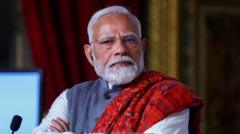When Prime Minister Narendra Modi arrives in Washington to meet President Donald Trump, warm greetings and laughter will undoubtedly characterize their encounter. This meeting, however, is poised to address significant topics that could affect the US-India relationship. Over the years, both leaders have built a strong rapport, showcased through high-profile meetings and public appearances, particularly in Houston and Ahmedabad. Their mutual concern over China has solidified the strategic partnerships essential for both nations.
While Modi's visit is expected to emphasize camaraderie, critical discussions surrounding trade agreements and tariffs will emerge. Trump is known for placing pressure on countries to reduce tariffs and potentially address the growing trade deficit between the US and India, which recently saw figures nearing $46 billion. In an effort to foster goodwill, India has already reduced some tariffs and repatriated a number of undocumented Indian immigrants.
Moreover, additional requests from Trump may arise, including what he might perceive as necessary further tariff reductions. This could be balanced by Modi's call for discussions on establishing an economic partnership to create favorable trade conditions on both sides. The prior administration's approach to trade was less stringent than current attitudes, which could play a role in negotiating terms.
The sensitive issue of undocumented Indian immigrants residing in the US is likely to be another focal point during discussions. Reports indicate that there may be over 700,000 such individuals in the US, and navigating deportation might prove to be a complex challenge for Modi and his administration. Reports of mistreatment during deportations have garnered concern, and assurances will likely be part of the talks.
Energy will also be central to the discussions, with Modi urging Trump to invest in India's nuclear energy initiatives. As India seeks to achieve a balance between renewable energy goals and energy security, seeking investments in this sector could help satisfy both parties' energy needs without resorting to fossil fuels.
Conversations around technology cooperation, particularly concerning H-1B visas for skilled workers from India, will be of significant importance as well. Modi is expected to advocate for maintaining this visa regime despite mixed reception among Trump's base.
In addition to bilateral topics, Modi may also touch upon international issues such as developments in Iran and the ongoing conflicts in Ukraine and Gaza. By engaging with Trump on these fronts, Modi will navigate the complexities of geopolitics while aiming to maintain a cooperative stance for the betterment of both nations.
Despite the serious undertones these conversations may take, both leaders are likely to emphasize the importance of the Indo-Pacific Quad, which comprises the US, India, Japan, and Australia. A proposed invitation for Trump to attend the Quad meeting in Delhi signifies the importance both leaders place on continued collaboration and a strong partnership that transcends individual transactional issues.
As Modi and Trump meet this week, a mix of warmth, diplomacy, and careful negotiation will set the tone for the future of US-India relations.


















